Key points:
- Both Altadena and Community United Methodist churches were among the Los Angeles-area houses of worship destroyed in the January wildfires.
- While temporarily worshipping in other churches, the congregations are planning for the yearslong rebuilding process and benefiting from support they have received.
- Many of the churches’ members also are dealing with the loss of their homes.
As August’s wildfires north of Los Angeles reach containment, survivors of the historic, monthlong inferno there in January are just starting to see signs of hope and recovery.
Those wildfires, among the area’s most destructive ever, forced over 200,000 to evacuate and obliterated more than 18,000 building structures, including many houses of worship. The flames also killed at least 30 people, including a longtime United Methodist.
Members of two destroyed United Methodist churches — Community in Pacific Palisades and Altadena — are temporarily worshipping in other churches. Many also are dealing with the loss of their homes.
Over six long months, the sprawling, grotesque ruins and mounds of debris at both churches and neighboring properties were painstakingly cleared. Now there are barren plots of land upon which to rebuild.
United Methodists have stepped up in response to the fires donating more than $1.3 million toward disaster recovery, thousands of dollars in gift cards and many hours of volunteer time.
“To me, that’s the superpower of our (connectional) system,” the Rev. Garth Gilliam, North District superintendent, said during a recent Altadena service.
But the road ahead remains long. While some rebuilding of homes has begun, it is still a fervent dream for these two congregations who lost their churches in the fires.
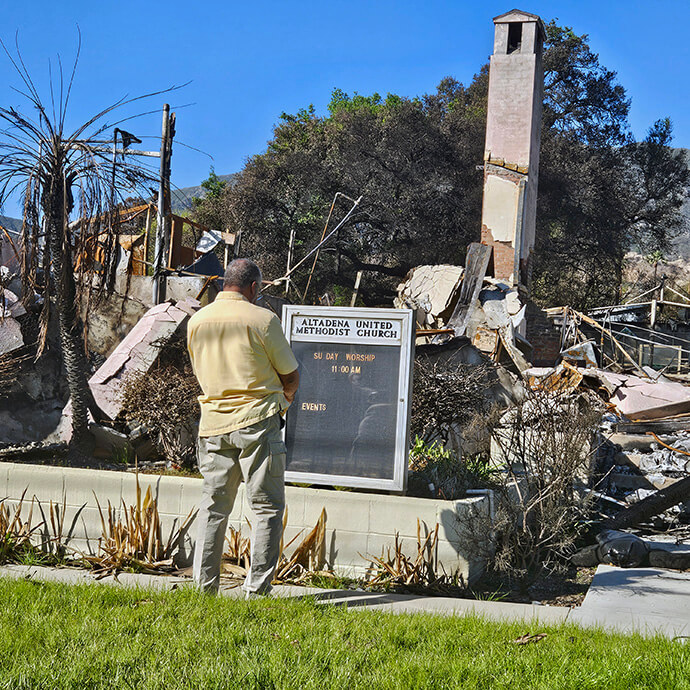
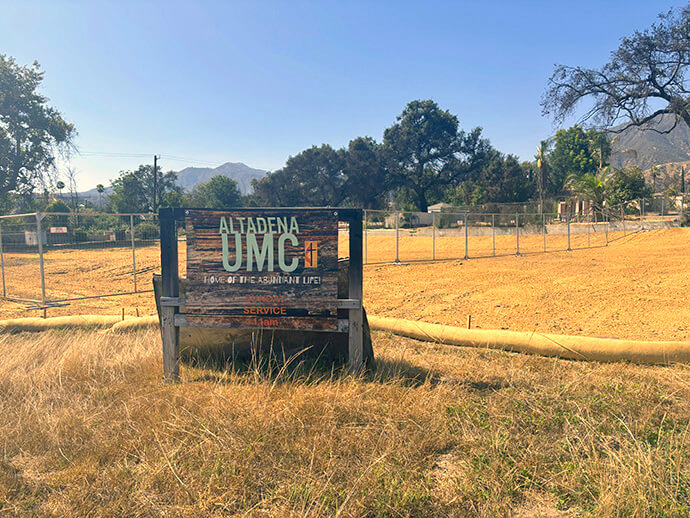
Altadena United Methodist Church
Altadena’s members moved into the sanctuary and campus of the former First United Methodist Church of San Gabriel on Aug. 3, after worshipping since January on Sunday afternoons at Scott United Methodist Church in Pasadena. Now they are happy to return to Sunday morning services and to plan other ministries for their new temporary campus, vacated after the First United Methodist congregation formally ended ministry June 29.
The new location is about nine miles, or a 20-minute drive, from the Altadena campus. The property needs repairs, including refurbishment of an outdoor play area to serve young people. That immediate need is a short-term fundraising priority over the church’s long-term rebuilding effort.
How to help
But members’ excitement about having their own space has produced needed energy to counter displacement fatigue and frustration over ongoing disaster recovery hurdles, said their pastor, the Rev. J. Andre Wilson.
He has led the interracial but mostly Black congregation’s growth from six members to more than 30 regular attendees, in his eight years there. Over a century old, the family- and youth-focused church emphasizes its positive, Scripture-based theme, “Home of the Abundant Life,” especially when inspiring support for its rebuilding efforts.
Andre and Heather Wilson’s home survived the Eaton fire. But in a recent interview they recalled the night he tried in vain to fight the massive, spreading blaze at the church with a garden hose, while also helping and consoling neighbors. Yet, they heard no fire engine sirens nearby.
A recent Los Angeles Times investigation reported that only one fire engine was in the church’s heavily Black West Altadena community, while hundreds more were fighting rampaging fires in more affluent East Altadena and over in Pacific Palisades. Fire Department officials blamed the stark imbalance on “human error” and confusion caused by catastrophic fires that raged far beyond their control. Of the19 people reported killed by the Eaton fire, 18 died in West Altadena.
The Wilsons are grateful for the recovery management efforts of church leaders in “a very intense process.” They are especially grateful for the Rev. Melissa Roux MacKinnon, whose serves as a “change manager” for churches in the North District.
“She’s been really helpful, coming alongside us,” Wilson said, “helping us with insurance matters, FEMA (Federal Emergency Management Agency) deadlines, SBA (Small Business Administration) loan applications, meetings with architects, and working with the conference and district on our behalf.”
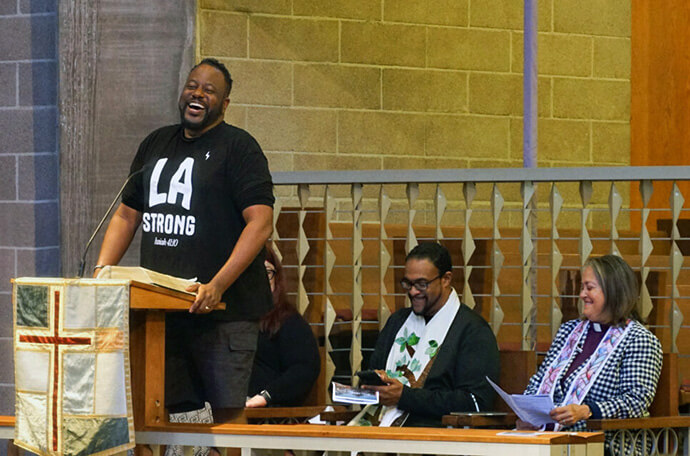
MacKinnon describes herself as a “go-between.” She said she feels honored to work with the church’s trustees and finance leaders while freeing Wilson to plan worship, do pastoral care and handle other administrative duties.
“Persons in this church have lost their homes, their church, their community. And they’re grieving,” she said. “When we start to envision their future, they say they want to get back to their church, their hub for ministry in the community that they love.”
She marvels at the faith of Antonio Watson, Altadena’s chair of trustees. “He lost his house and everything,” said MacKinnon. “Yet, he is so grounded in his faith in God that there are moments when we’re talking about the process and problems, and he just says, ‘God will provide,’ like he really believes it.”
Subscribe to our
e-newsletter
During a June 13 panel presentation on disaster response at the California-Pacific Annual Conference, Watson spoke about his congregation’s recovery efforts and the struggle to remain faithful despite doubts.
“This was something that we needed to go through to know that God is real, that there’s something on the other side that God has for us,” he told the conference. “I am prayerful that we will continue to operate with eyes of faith and go forward.” The next day his pastor preached at the conference’s closing ordination and commissioning worship service.
At the congregation’s final worship service at Scott United Methodist, Gilliam, North District superintendent, preached to the two congregations jointly and then presented both with Community Courage awards. The award for the Altadena congregation credited its “resilience, grit and faith to bounce back from adversity.”
“It’s important to continue sharing our story and the impact of the fire on our community to keep needed financial support coming in,” Wilson, the church’s pastor, later said in an interview. “But we also emphasize the need to let go of what has been lost and look forward to new opportunities. I know it’s painful now. But we’re going to have a new church someday with new opportunities for ministry. We don’t know how God will do it. But we know it will be abundant.”
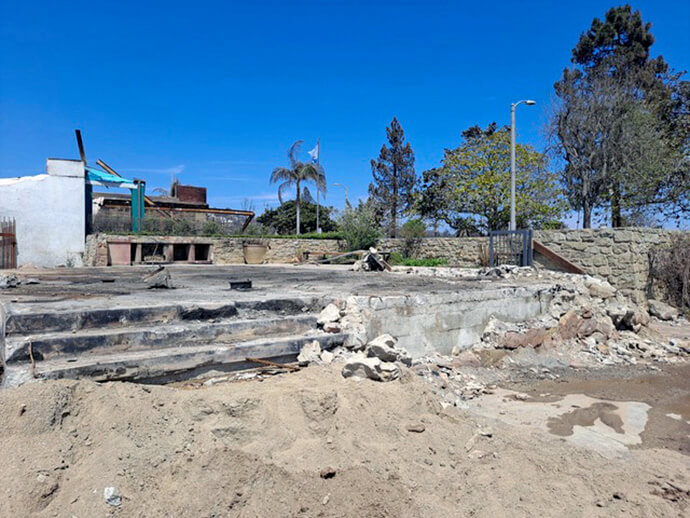
Community United Methodist Church
Since May, Community United Methodist Church’s congregation has worshipped just four miles away from their celebrated Pacific Palisades neighborhood. They are welcome guests in the chapel of First United Methodist Church of Santa Monica, where the host congregation worships in its sanctuary.
The Rev. Cathleen “Catie” Coots, Community’s new pastor, shared in a recent interview about the church’s loss of multiple properties but also its emerging plans for restoration.
The Rev. John Shaver was appointed there for only six months before the January Palisades fire destroyed the church, its parsonage and most neighboring homes and businesses. During a tour of the site March 18, he spoke candidly of the challenges and emotional turmoil of critical losses, the resulting chaos and his uncertainty of what would happen next.
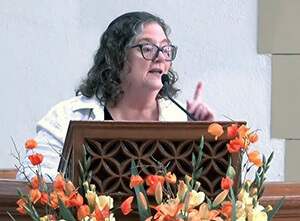
Shaver took a leave of absence in April. But as his successor, Coots may be ideally suited to face the challenge of rebuilding. She served as the church’s pastor from 2012 to 2015. And at Bishop Dottie Escobedo-Frank’s request, she provided administrative support to help Shaver manage the crisis from January to April. After becoming interim pastor in April, she became the appointed pastor in July.
Coots, a fourth-generation Methodist pastor, retired in 2023 after 41 years of full-time ministry. Having her pension benefits the financially strapped church. And she has many helpful connections throughout the conference. But she sees her familiarity and affection for Community’s members as a special advantage.
“I already knew a number of the people, and they knew me and trusted me,” she said. “So, in the midst of this chaos and loss, I was someone they knew they could rely on. That makes a big difference.”
Leading the church’s recovery has meant helping its longtime bookkeeper find and reconstruct scant financial records, while also working with FEMA and the conference’s insurance provider.
“I have had to learn a lot of things with God’s help,” Coots said, “and I gain strength from God and from our members and supporters every day.”
The church lost 90% of its income and faces a $30 million rebuilding cost, with only $12 million coming from insurance, she reported. That rebuilding must include the church’s much-admired preschool, destroyed by the fire and now temporarily relocated to West Los Angeles. It had a $1 million budget and a waiting list of 100 children. Also, the historic church, which played a crucial role in establishing the Palisades community, had several commercial properties along nearby Sunset Boulevard that were a lifeline of rental income.
“The church is waiting for the results of a feasibility study to make decisions; but we anticipate a phased approach to rebuilding, including spaces that can be used for multiple purposes,” Coots said. The sequence may begin with the parsonage, including a larger living room to serve as a temporary worship space, followed by the commercial rental property and the preschool. Then the sanctuary, fellowship hall and other facilities may follow.
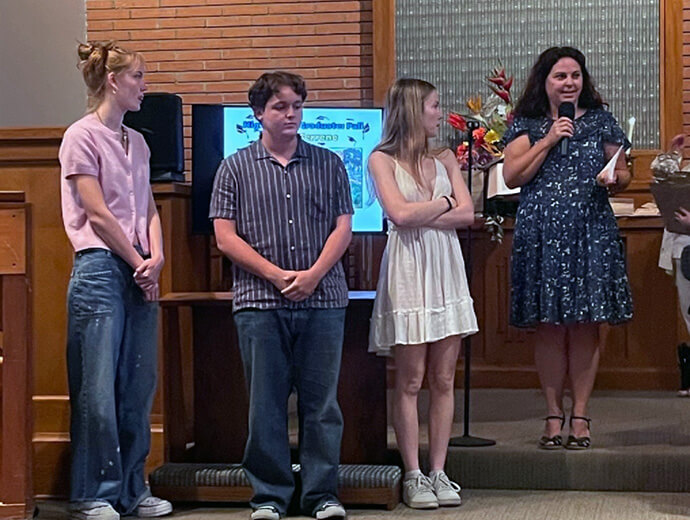
Bryce Swanson, Community’s lay leader, praised Coots’ leadership when he addressed the California-Pacific Annual Conference during the June 13 disaster-response panel discussion.
He recalled how Community suddenly became the local United Methodist Committee on Relief assistance center when the conference’s disaster response task force parked its trailer in front the burned-out church and offered supplies to anyone in need.
“Without exception, those we helped were grateful, and many were amazed that the Methodists were offering assistance to the community, even though our church building was gone,” Swanson said. “But they weren’t only grateful for the supplies. After speaking with dozens and dozens of people, I got the impression that they were equally grateful for the opportunity to tell their stories. I know that we were grateful for the opportunity to listen.”
Community United Methodist Church of Pacific Palisades is affectionately known as the church that built a town, Swanson told the assembly. “But of course, the church and most of the town are gone now. We believe that Catie will bring stability to an unstable situation.”
He added that he is confident that decades from now, “we will also be known as the church that helped rebuild a community.”
Despite not knowing all the details, Coots believes the church can rebuild within three to five years — but only with community involvement. It could take longer, she acknowledges, especially if complicated by federal tariffs on building materials and labor shortages from increased federal immigration enforcement.
She lauds the participation of church members and local volunteers in planning meetings and feasibility studies as crucial for the rebuilding process.
“Our multi-generational church’s long-term vision and commitment to rebuilding are supported by the community’s deep affection for us,” Coots said. “Meanwhile, our members alternate between feeling heartbroken and discouraged but then also finding resilience. It’s not just knowing how to do what needs to be done. It’s also believing that we can do it. That’s most important.”
Coleman is a UM News correspondent and a licensed local pastor. News media contact: Julie Dwyer, news editor, [email protected].




